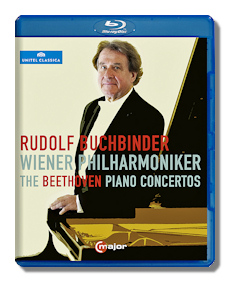
The Internet's Premier Classical Music Source
Related Links
- Beethoven Reviews
- Latest Reviews
- More Reviews
-
By Composer
-
Collections
DVD & Blu-ray
Books
Concert Reviews
Articles/Interviews
Software
Audio
Search Amazon
Recommended Links
Site News
 Blu-ray Review
Blu-ray Review
Ludwig van Beethoven

Piano Concertos
- Concerto for Piano #1 in C major, Op. 15
- Concerto for Piano #2 in B Flat Major, Op. 19
- Concerto for Piano #3 in C minor, Op. 37
- Concerto for Piano #4 in G Major, Op. 58
- Concerto for Piano #5 "Emperor" in E Flat Major, Op. 73
- Bonus Track – Buchbinder's Beethoven – A musical conversation between Rudolf Buchbinder and Joachim Kaiser
Rudolf Buchbinder, piano
Vienna Philharmonic Orchestra/Rudolf Buchbinder
Recorded live May 5-8, 2011 at the Musikverein (Goldener Saal der Gesellschaft der Musikfreunde), Vienna
Unitel Classica/Cmajor Blu-ray 708904 215min LPCM Stereo DTS-HD Master Audio
Also available on 2DVDs Unitel 708808: Amazon - UK - Germany - Canada - France - Japan - ArkivMusic - CD Universe - JPC
Of the Beethoven five concertos, three have generally been viewed as masterpieces (Nos. 3, 4 and 5) and two as youthful near-masterworks. Actually, I'd be comfortable calling the First a masterpiece, though the Second (which was chronologically the first composed) clearly can't stand with the rest. All are challenging works for the performer and most listeners will find them rewarding experiences, especially in performances this good.
In this his second cycle of the five Beethoven piano concertos Rudolf Buchbinder, who also serves as the conductor here, gives insightful, muscular and fairly straightforward readings of these masterpieces, and the performances he draws from the orchestra are spirited and accurately played. In contrast Murray Perahia on three Sony CDs displays a greater range of dynamics, a more nuanced sense of color, a somewhat greater alertness to shifts in emotion, and in general seems to impart more finesse and refinement. So, game over, right? Not so fast!
Rudolf Buchbinder sees Beethoven as a heartier, more imposing and more jovial composer whose music touches the heart directly: while there may be less variance in his dynamics than what one typically might encounter, he is nevertheless attentive to the emotional flow of the piece. Thus, he is more likely to romp than stomp, and more likely to let the music speak for itself than dress it up. In addition, his accuracy is almost uncanny and he consistently eschews attempts at virtuosic showmanship.
His First Concerto is bright, muscular and brimming with a youthful sense. He draws crisp, at times powerful playing from the orchestra, and his performance of the cadenza is especially sensitive and builds to a spectacular close. The ensuing Largo is lovely in its clear, straightforward phrasing and dreamlike character. His finale is a romp of total joy where Buchbinder points up both wit and mischief: this is one of Beethoven's most infectious concerto movements, featuring catchy themes and imaginative thematic development, and Buchbinder misses none of the humor, even if he often imbues phrases with forte-laden dynamics. A splendid performance!
Buchbinder's Second Concerto is bubbly enough, though again there is a muscular character to both the piano and orchestral playing. Still, the youthfulness of the work comes through. Colors are bold and the music crackles with energy and boldness in the outer movements.
The Third Concerto follows the same interpretive approach, but here Buchbinder the conductor is especially alert to subtle phrasing of the thematic material, notably in the opening orchestral exposition. His entrance on the piano is emphatic and dramatic, and he keeps your interest thereafter with spirited tempos and an unerring sense for Beethoven's emotional shifts, even if he, once again, generally favors louder dynamics. His finale is hearty and colorful, fully capturing Beethoven's humor and infectious joy.
The Fourth features a first movement that is by turns romantic, joyous, serene, intense, and epic. That whole panoply of Beethovenian expression is there in spades. Indeed, and as Mahler would strive for in his symphonies, it is music that expresses a whole world. In Buchbinder's hands that world is bright and optimistic, full of hope. The Andante con moto second movement is less dour than in other versions, owing to Buchbinder's livelier tempos and sense of contrast. The finale brims with delight and triumph. Some have claimed the Fourth is the most profound of Beethoven's piano concertos – perhaps it is, but profound doesn't necessarily equal greatest.
The "Emperor", in my opinion, is Beethoven's greatest piano concerto. Buchbinder's rendition here brims with triumph, his lively tempos and sense of both wit and epic moment yielding a most glorious account of this great movement. The dreamy second movement is splendidly played and while most pianists do quite well in the finale, Buchbinder is especially effective here because of his often bluff yet consistently sensitive treatment of Beethoven's colorful music. At times the music seems almost to jump right out at you, so lively and spirited is the playing by both Buchbinder and the Vienna Philharmonic, especially in statements of the main theme. In the end, this must be judged an utterly splendid account of the "Emperor".
Among the competition, I have already mentioned Perahia on Sony, but also worthwhile are Brendel (on Vox and twice on Philips), Weissenberg/Karajan (EMI), Lupu/Mehta (Decca), Ax/Previn (RCA) and, on video, Barenboim (EuroArts), who also conducts from the keyboard. I would give the edge to Buchbinder over Barenboim in the video realm, and he makes the choice tough when considering all others on CD. Perahia, of course, and perhaps Brendel/Rattle are certainly worthy contenders, but if I had to take one Beethoven concerto cycle to a desert island, it might just be this new Buchbinder effort. I should mention there is an interesting bonus track featuring Buchbinder in conversation about Beethoven with musicologist Joachim Kaiser. The language is German, but there are English and other subtitles and the film runs nearly a half hour.
Copyright © 2012 by Robert Cummings.





















